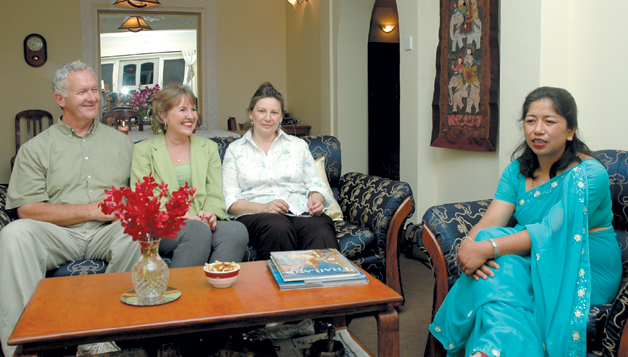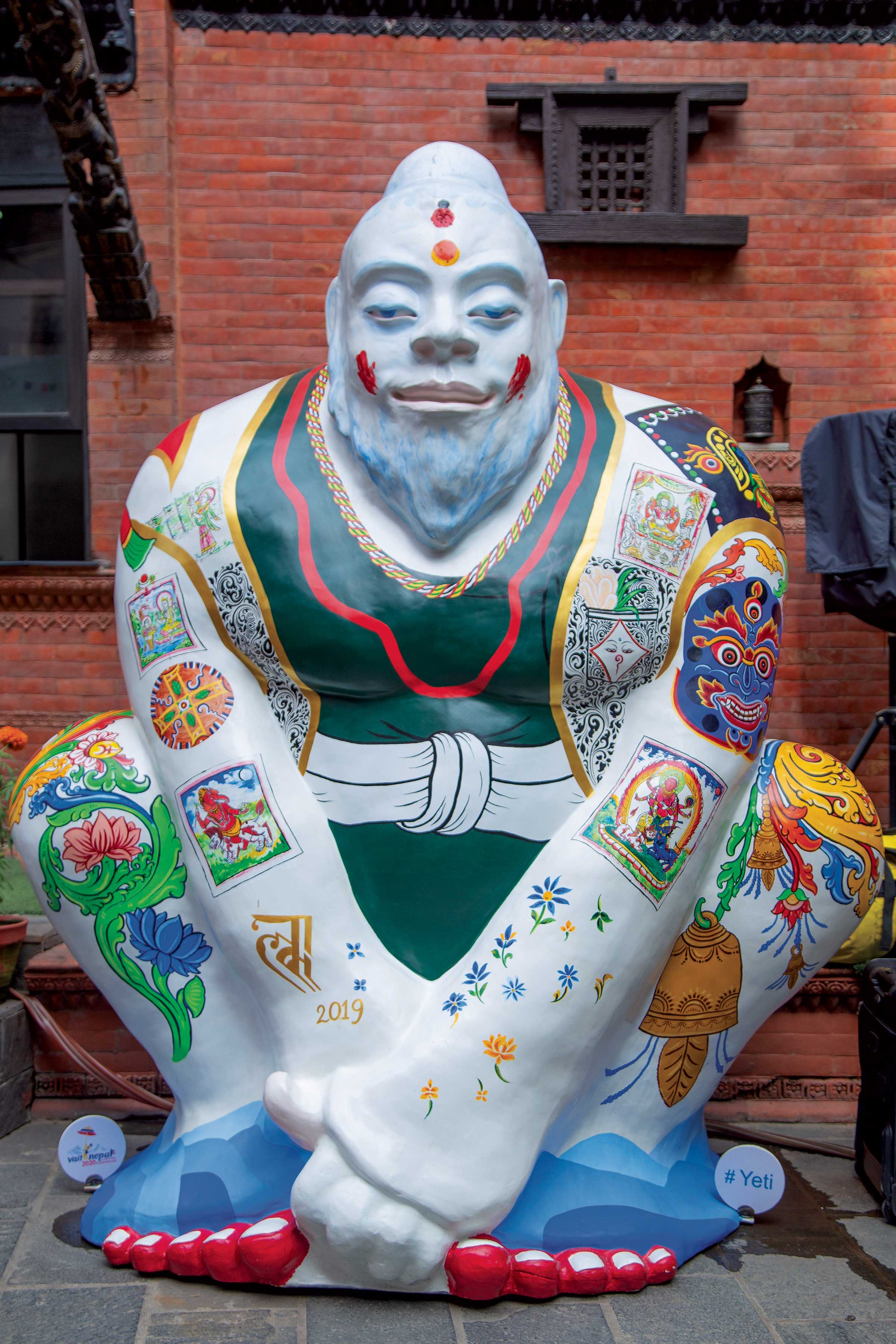
We were all gathered at Romae’s house in Baluwatar with RamDevi ushering us in and Romae playing host; Eva Gruenwald from Nevada and Charles and Romae Bush from Alabama were students learning spoken Nepali from Ram Devi. Eva’s husband, Jon did not make it for the interview although he’s one of the students. Both couples have been here for the past year or so and had been learning Nepali at ECS Maharajgunj office twice a week and an hour a session. My first question to Charlie to break the ice was, ‘Related?’ meaning ‘to Bush?’ and a loud Southern laughter filled the room and we felt at ease.
“Nepali is completely different from English and we had to start from scratch, from day one. We started with small words and have worked into larger ones. It was very hard to start from scratch, but it was wonderful and we’ve enjoyed it,” initiated Romae, the tip of the conversation, and to my query as to how interesting it felt going back to school, she replied, “It was, it was and Ram Devi makes it fun for us”.
“The structure of Nepali sentences is opposite to what we are used to in English, verbs at the end and prepositions and phrases come first or something of that nature. But we have gotten where we can understand when you speak ‘Bistaree’, spoke Charles. You guys speak a bit ‘Chito’ which is interesting in itself, replied Charles. ‘We can understand quite a bit of what is being said but though our answers may not be exactly what you want to hear, it helps. Like in all foreign countries in the world, you are appreciated when you at least ‘trrrry’, said Charles curling the last word in a Southern drawl. “Faces of people just light up, especially those of Taxi drivers when we say something in Nepali, and they reply back so fast that we both, indicating to Romae, chimed in loudly together ‘Bistaree’. Our office workers like it and try to help us learn new things. They derive enjoyment out of us for at least trying to speak to them in their own language and it’s interesting too,” ended Charlie on his part of the view.
“Memorizing words is the hardest part because we can’t relate it to anything. I thought knowing some other languages would help me with learning Nepali, but it didn’t. You actually have to start memorizing words until things start making sense and memorizing Nepali words is difficult,” at last spoke Eva and she added, “but we’ve learnt and memorized everyday stuff like, replying to simple questions like what’s your name and address, where we work at, shopping terms, etc.”
And the first sentence they learnt to say in Nepali was, ‘Tapai ko Naam Kay ho?’ at which the three students shared a secret joke and laughed aloud. “I had to learn numbers very fast because I had to shop and wanted to know the denominations because a calculator could not always be summoned upon, in case of a deadlock of words,” explained Romae on my query. “Like in certain parts of our country where we still don’t understand what people are saying to each other though they are speaking in English, what kind of expression would the shopkeeper have when he hears something else? But once you’ve tried and succeeded, it makes you more confident and makes you want to do better,” explained Romae.
Though they have yet to learn to read and write Nepali, they seemed to enjoy their learning like explaining to the vegetable vendor what they want and trying to understand the number the vendors are charging them, and most of all that they can bargain while shopping. “We don’t have any bargaining system in the US, but its fun here,” confirmed Romae on the theory of learning numbers.
Addressing people in Nepal is tricky. You need to know whom to address with what. And perhaps that is something that the US has lost over the years, was a view shared by all three. “It is nice to be part of an interesting culture that shows a lot of respect,” imparted Romae speaking for all three.
“Ram Devi is patient with us and sometimes we try hers too. Mildly, though it’s hard to learn verbs, the tenses of the verbs are driving me crazy. I’ve enough problems with the words but learning all the verbs with its tenses, and the congregation of the verbs just gives me the problems, though I’m trying,” spoke Charles. “I found it easier to learn the grammatical part but memorizing words is still hard but knowing that people are still trying to help you even with limited vocabulary makes you want to try harder,” summed up Eva on the lines of my query on how hard it was for them to learn to address people in Nepali.
“We have been to Nagarkot, Dhulikhel and taken the Shivapuri walk and that’s about it in the valley because we work 60 hours, six days a week and we still have a lot to do,” explained the wives, “Yet Ram Devi still gives us homework and she makes us converse with each other in class, in Nepali of course. That way we have to understand what she is ‘Bistaree’ saying and try to respond to it,” she further added.
“The few shops that we frequent, know that we are learning Nepali, and they never talk to us in English, though they are fluent with the language. That way it’s good for us because we polish up our little knowledge. We can pick up what they are saying most of the time, though we can’t respond exactly. But it’s great to converse with the natives,” unanimously the three speak. “We know that it probably is not the right answer but they understand that we’re not from here. They recognize that and it makes it even better when they know that we try,” they explained.
“We were recently in Bangkok and we talked to each other at the subway in Nepali and in some of the stores we would answer in Nepali. It was fun to see the dumb founded expression on the faces of the Thais,” spoke Romae and added, “but we sometimes converse with each other in Nepali at home too. We probably are not saying the right thing to each other, but then we understand each other perfectly and we try.” And here I was thinking of how to explain to my wife about the delay in reaching home.
“In Alabama we have ‘iced cold tea’ and Ram Devi was surprised to come to know of this. Thus, we sometimes tell her of the States, but instead we’ve learnt a tremendous amount of Nepal from day one; of its culture and its people. Being here and not learning Nepali would mean that I’m missing something. Yes, I don’t expect to sit down and have a full-blown conversation with the natives, but I want to learn and understand something at least. To me that’s the part of the whole experience of being here in Nepal,” said Charles. “We have not learnt any Nepali folk songs as yet, but we do know how to rhyme the alphabets,” explained Romae and Eva together glancing at Ram Devi.
“This is the first country that we’ve lived besides the US and it is completely different from ours; the culture, language, food, system, etc. but Nepal has wonderful people and they excel in hospitality. We’ve lost a lot of that in the US, but seeing something similar of my southern upbringing is just wonderful. People all over the US want to talk to a Southern gentleman and their hospitality is much talked of because in other regions it’s always tense – no one speaks to nobody. But Nepali hospitality beats Southern hospitality anytime,” growled Charles in his Southern accent. In the end Romae served us Chocolate Fudge. Talk of Southern hospitality.
And at that moment in humbleness, it dawned on me that the best part of the day was just beginning and has stayed with me till now, and it was time to bid goodbye. Today is the 20th of June 2006 and ‘now’ is exactly 6:30 pm. The monsoon arrived just about now, on schedule.
Eva Gruenwald is originally from Romania, but lives with her husband Jon in Nevada, USA. Jon works as the project manager for CADDELL Construction Company, which is building the New US Embassy in Kathmandu. Eva and Romae Bush work for the same company in the Document Control department. Charles, Romae’s husband is the QC Manager for the same. They plan to stay here for another year. Ram Devi Shrestha is Director for ECS Services at Tusal, Maharajgunj.










